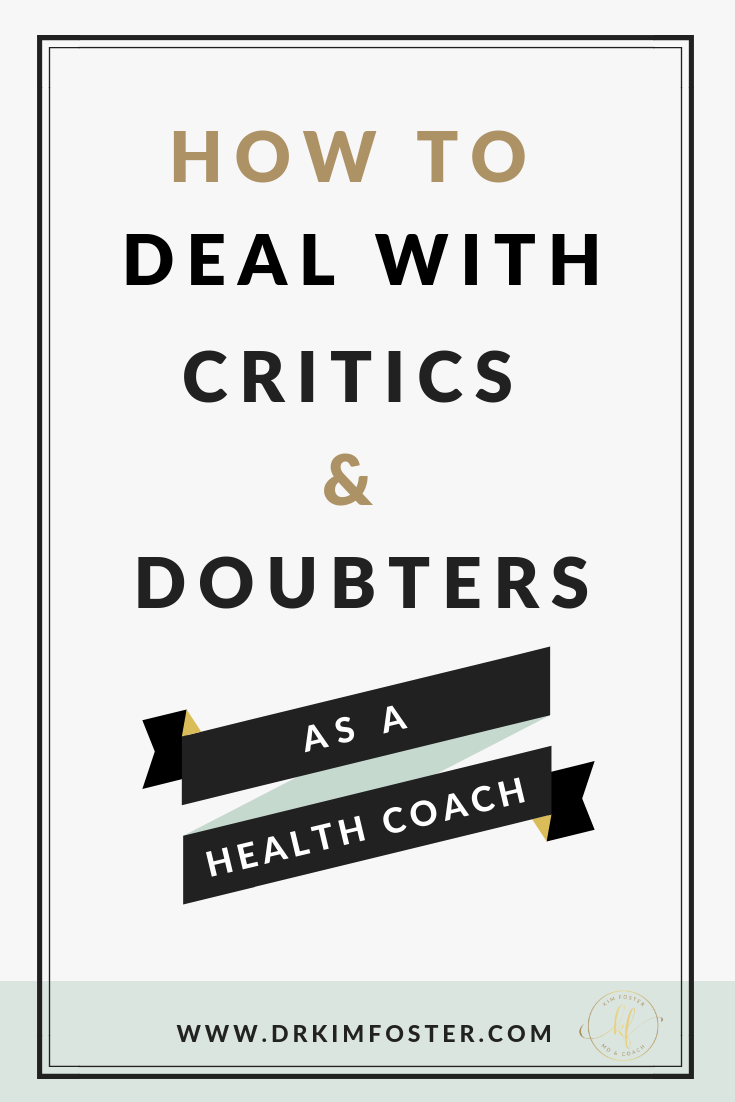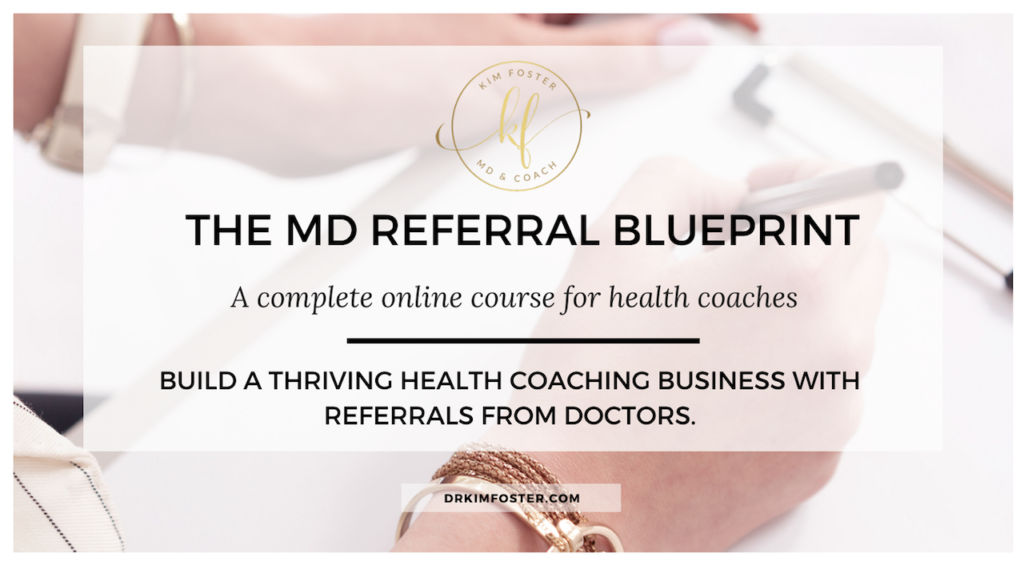As a health coach, you’re probably very excited about wellness, about getting out there and helping people, and about growing your business. Some people you talk to may be…less excited. In fact, sometimes people can be extremely negative about your chosen career path.
Sooner or later, all health coaches will encounter people who have a problem with what you’re trying to do — whether it’s another health professional, a friend, or a family member.
And this can really take the wind out of your sails. It can be a major blow to your self-esteem, and worst-case scenario, it can make you question your choices.
So the question is: How to deal with this? How do you stay strong in the face of this kind of criticism and negativity.
Well, check out the video below (or keep reading), because that’s exactly what I’m going to tackle here.
Tip #1: expect critics at some point
The first thing, is to EXPECT to encounter this, sooner or later.
Here’s a common scenario, inspired by a real situation that happened recently to a health coach:
You’re talking to a friend who happens to be a registered dietitian. You haven’t seen her for a while, and you’re excited to share your news that you recently became certified as a health coach. You’re working on putting some programs together and starting to think about some marketing ideas, and you’ve even had a few early clients who have had some good success. You can feel like you’re making a difference, and you’re excited to help more people on their health journey.
She takes this news…not so well. As you’re talking, she starts to frown. She then goes on to express concern because only registered dietitians have the proper education to give out advice related to weight loss. She seems to be taking your happy news and your excitement as some kind of personal attack.
Now, you only begin to guess why she may be reacting this way. Maybe she’s feeling threatened, maybe she’s insecure, maybe she just lost a big client and is dealing with her own financial crisis…or perhaps she’s just uninformed. Maybe she doesn’t really know what a health coach is, what a health coach does … you just don’t know. You can’t guess what’s going on in her head or her life that has made her react this way, so it’s pointless to try. Maybe she’s threatened, but you can’t really assume that, and it won’t end well if you do.
It’s important to keep in mind that health coaching is a relatively new profession. Health coaches are one of the newest members of the health care team, so when you start interacting with people in one of the more traditional healthcare roles, you may encounter a lot of skepticism and doubt.
So that’s my first tip: expect critics. Expect doubters and naysayers … and even haters. If you haven’t encountered these people yet — to be honest, it probably means you’re not talking about your work enough. And maybe that’s worth examining.
But I want you to expect this response, so you’re not caught off-guard, so you’re ready, and you don’t take it personally. This kind of criticism can be very unpleasant, and it’s particularly hurtful if the person expressing negativity is someone whose opinion you value or trust, or if it’s someone you like or admire.
Tip #2: Be ready with facts
It can be very helpful to have a few simple facts at your fingertips to pull out in situations like this.
If it IS a case of your critic being somewhat uninformed about health coaching, it can be helpful to have a few simple things to say, to help this person understand. This isn’t really about you engaging in a debate, so much as you functioning as a bit of an ambassador. Like I say, health coaching is a new profession, and I personally believe it’s important to spread the word. So although you may be tempted to back down and immediately walk away from the confrontation, consider hanging in there for a moment to calmly dispel a few myths.
Again, this isn’t about being defensive, or triggering an argument. Just think of it as taking an opportunity.
For example, it might help to share the fact that the American Medical Association has some very positive things to say about health coaching:
“Research shows that health coaching has a significant positive impact on patient health. Having a health coach as part of the team may help [a medical] practice meet quality metrics, improve patient satisfaction and behavior change and free up physician time.”
The American Medical Association also has this to say:
“Health coaching is a collaborative approach to care that informs, engages and activates patients to take a prominent role in managing their health. By bridging the gap between the physician and patient, health coaches can help practices improve patient engagement in their care, leading to healthier patients with better outcomes.”
As for the common misconception that only registered dietitians, doctors, or other traditional professions can play a role in people’s health, the AMA has this to say to its physician members:
“Effective health coaches can have varied backgrounds. Anyone on your care team, including nurses, MAs or even a care coordinator without clinical training, can be an effective coach.”
So to your critic, you can say something like: “I understand that not many people have heard of health coaching or understand the role health coaches can play, but the American Medical Association stands behind the concept of health coaches” … and then go on to paraphrase the things above.
Of course, the AMA is not the last word, and some people may not want to hear it. They may not value the opinion of the medical community. They also may not care that research is beginning to show some very real benefits of health coaching. That’s okay.
If they’re not on board, no problem. It’s not your job to convert them.
Pay attention to the signs that you have waded into an unwinnable debate. For some people it will be like arguing religion or politics. You can’t shift them, and you’re just going to get frustrated.
At this point, it’ll be time to employ strategy #3!
Tip #3: Release with love, and move on.
Plain and simple, you don’t need this kind of negativity. It doesn’t serve you or your business.
Take the high road. Agree to disagree, and then change the subject … or find someone else to talk to.
Stand strong in your truth. You know that what you do provides real value for people, can make real change in people’s health and wellbeing, and it is absolutely your right to create a fabulous business for yourself.
Now, if this criticism is triggering your impostor syndrome — which it may well do — that’s worth examining. I did a whole separate video on the topic of impostor syndrome, which might be worth watching. Impostor syndrome is a very common thing for many people, and there are definitely ways to conquer it.
But the main thing is: you can’t let one person’s opinion stand in the way of your plans and dreams.
If you have to–use it as fuel. Prove her wrong. One of my favorite football players, Julian Edelman, faced a huge number of critics and naysayers at the beginning of his career, and his take on this is this:
“There are only two things you can do when someone says you’re not good enough. You can prove them right, or you can prove them wrong.”
Building your own business is hard. If the doubters give you a little extra motivation boost, if they light a fire under you to prove them wrong … then I say use it.
Now, along the lines of building that business, I mentioned the AMA’s opinion on health coaching, and these statements can also come in handy if you’re thinking of approaching doctors for referrals into your health coaching business.
Which is something I definitely think you should do!
RECAP:
Now, to recap…here are the steps to dealing with critics, haters, and naysayers:
- Expect critics at some point.
- Be ready with a few simple facts.
- Release with love, and move on.
Now, once you’ve dealt with your critic, you want to get on with the business of doing your work. And one of the most effective ways of growing your client roster is through physician referrals.
And I have a free guide to help you with that — my guide for health coaches called How To Get MD Referrals. Just click the image below to download the PDF for free!
P.S. If you want even more support in pursuing physician referrals, you may be interested in my online course. I invite you to check it out below. (And note the special back-to-school sale price!!)








